FMs Of Iran, Saudi Arabia Discuss Gaza Situation
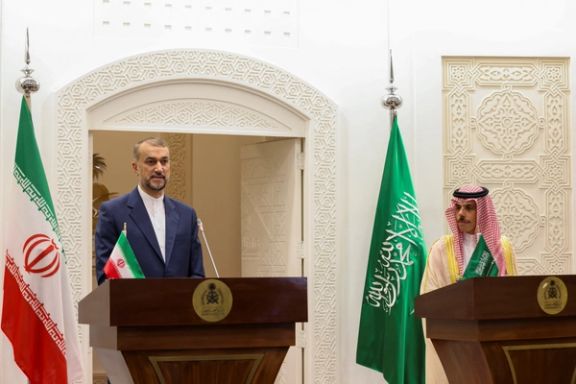
The Foreign Ministers of Iran and Saudi Arabia spoke about the ongoing situation in Gaza on Sunday as Israel and Hamas continued into week three of war.

The Foreign Ministers of Iran and Saudi Arabia spoke about the ongoing situation in Gaza on Sunday as Israel and Hamas continued into week three of war.
Hossein Amir-Abdollahian, the Iranian Minister of Foreign Affairs, and his Saudi counterpart, Faisal bin Farhan, spoke by telephone according to the Iranian Students' News Agency (ISNA).
The conversation addressed what Amir-Abdollahian termed the "dangerous developments in the Gaza Strip" in familiar language reiterated by Iranian regime figures since Hamas declared war on October 7. The two apparently underscored "the pivotal role of the international community in achieving a ceasefire and safeguarding the civilian population, especially in light of the escalation of military operations", as Israel began targeted ground operations this weekend.
The engagement between Iran and Saudi Arabia follows their in-person meeting at the end of October during a session of the Executive Committee of the Organization of Islamic Cooperation held in Jeddah.
Last week, US President Joe Biden said a primary goal of Iran-backed Hamas' attack of October 7, the single most deadly day for Jews since the Holocaust, was to throw out normalization between Israel and Saudi, following deals with other Persian Gulf states under the Trump administration.
"One of the reasons Hamas moved on Israel ... they knew that I was about to sit down with the Saudis," Biden said. "Guess what? The Saudis wanted to recognize Israel."
Just days ago, the Deputy Commander of Iran's Revolutionary Guard, Ali Fadavi, claimed that Hamas had successfully disrupted efforts to normalize relations between Saudi Arabia and Israel with its attack, which it deemed a US conspiracy.
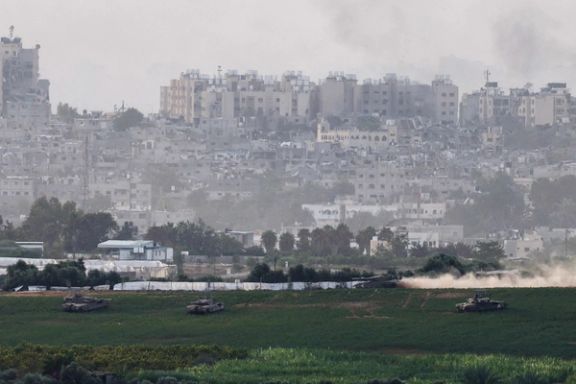
Both the US and Iran say they do not want the Hamas-Israel war to spiral out of control, but Iran roots for the militants and the US is beefing up its military presence in the region.
Iranian Foreign Minister Hossein Amir-Abdollahian said during an appearance on CNN Sunday that Iran does not want the Mideast war to "spread out."
"We always had political, media, and international support for Palestine. We have never denied this," he said, adding, "This is the truth, but in relation to this operation called the Al Aqsa Storm, there was no connection between Iran and this Hamas operation, not my government nor part of my country."
Earlier in the day, Iranian President Ebrahim Raisi renewed threats to Israel and the US after Israel launched the ground offensive in Gaza. "The Zionist regime's crimes have crossed the red lines, which may force everyone to take action," he said, suggesting once again the threat of action from its proxies in the region.
White House national security spokesperson John Kirby said Sunday that he would not comment on the expanded ground operation, but he said Washington supported Israel's right to defend itself. "We're not drawing red lines for Israel," he added.
Authorities in the Iranian regime issue fiery statements, threatening escalation in the Gaza war, but they have not taken any concrete steps on the ground to underpin their claims. Media outlets affiliated with the regime and its Revolutionary Guards cite local media about attacks on US bases, but no Western source confirms such reports.
Two US fighter jets struck Iran-linked military facilities in Syria early Friday, a few hours after 900 more US troops arrived in Syria to bolster air defenses for American personnel amid a surge in attacks by Iran-backed militias. Earlier, White House spokesman John Kirby confirmed that Washington has “relayed direct message” to Iran after Biden reiterated its “warning to the Ayatollah,” referring to Iran’s ruler Ali Khamenei.
The Kremlin said Friday that the US strikes show broader regional tensions but claimed there is no danger of Russia being dragged into the conflict. The statement came as Moscow's decision to invite a Hamas delegation has outraged Israel, which urged Russia to expel the group, calling the invitation "deplorable".
The United States has moved 'naval cities' to the region, a move that can be construed as a more consequential move than the symbolic trip by President Joe Biden to Israel to see with his own eyes the aftermath of Hamas attack that killed 1,400 Israelis. What can the US president do for over 220 hundreds of hostages, including Americans, from Tel Aviv that he cannot do from the White House?
As the war between Israel and Hamas reverberates across the Middle East, the risk of war between Hezbollah and Israel remains higher than at any point since their last big conflict in 2006. Reuters cited unnamed sources as saying that Hezbollah knows that Lebanon, with a struggling economy and a crumbling state, cannot afford another war between Hezbollah and Israel. "Hezbollah has no interest in war. Lebanon has no interest in war", a source familiar with Hezbollah thinking said.
Israel has time and again explained to the international community how most regional vices are done by tentacles of the Islamic Republic regime. After all, even if it is possible for Israel to eliminate Hamas militants, they will resurrect thanks to Ayatollah’s deep pockets being endlessly fed with oil money.
Immediately after the multi-thronged operation that Hamas calls al-Aqsa Flood, proclaiming its goal of flooding Israelis out of al-Aqsa, Iran and several other countries and world bodies started urging not to escalate the conflict. Israel has started testing the waters of a ground invasion but wants the world to side with it in the war that according to Palestinian authorities has killed over 7,000 Palestinians.
Israel, which had depended heavily on its military tech and intelligence to control sporadic attacks by the Islamist attacks and was caught by surprise -- has called up hundreds of thousands of reservists, its largest-ever. To acclimate the new army, whose forces have mostly been far from the military atmosphere, the US may be stalling before the conflict enters the next phase, an idea popping up in conversations about the Mideast crisis.
The reason that Iran does not take US warnings seriously and calls them “requests” is the lack of – or very limited – response to attacks on US troops by Iran-backed forces. Iranian President Ebrahim Raisi’s deputy chief of staff for political affairs Mohammad Jamshidi “does not take President Biden’s warnings seriously,” said Jason Brodsky, the policy director at United Against Nuclear Iran. “That should tell the White House something especially after over 13 attacks on US forces in October,” he added.
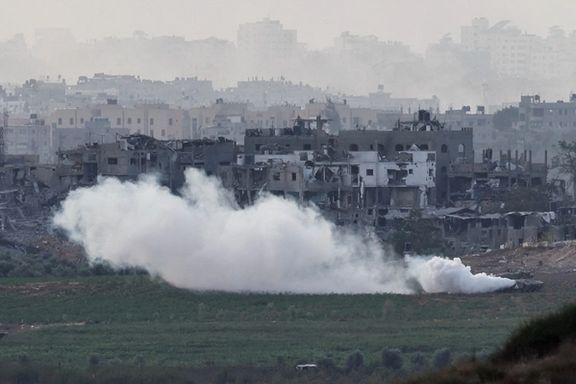
No major blow has been delivered against Tehran and its proxies, except for the targeted killing of IRGC’s Quds force commander Qasem Soleimani, the architect of Iran’s vast network of militias in the region. US Senator Rick Scott (R-FL) used Soleimani as an example of how the US should deal with the menace of Iran. “If Iran attacks the United States, everything the Ayatollah loves will be a target, and as you know, our aim is very good. Ask Soleimani,” he said on X (formerly twitter).
The war of words and visits to the region along with international meetings can be a prelude to the next phases of the conflict that may set the ground for World War III, that probably ensues after China joins Russia and Iran against the West.
The US has deployed large military power to near Israel but claims it will not engage in the conflict and pursues diplomacy to resolve the crisis. Biden also emphasized that its warning was about attacks on US forces and had “nothing to do with Israel at all.” However, 'Ayatollah,' who believes “diplomacy and battleground” are two complementary things which do not negate each other, claims Israel will not exist to see 2045 and moves toward his dream with material and psychological support.
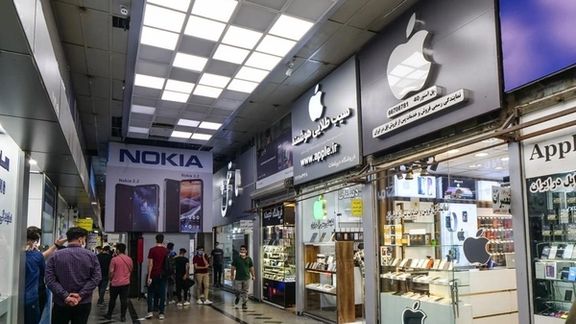
The Tasnim News Agency, associated with the Revolutionary Guards, has accused a new sponsor of the Esteghlal football club of engaging in the smuggling of iPhones.
In the past year, the Islamic Republic has not registered iPhone 14 and 15 models, and in recent weeks, following the introduction of the iPhone 15 to the market, it declared the buying and selling of the devices as “illegal”, citing them as contraband.
Citing the Amol Mobile Shop, the Tasnim report stated, "An examination of some viral videos in the virtual space shows that the new sponsor has been involved in offering prohibited iPhone 15 series in recent weeks."
Meanwhile, the secretary of the Coordination and Supervision of the Fight Against Smuggling of Goods and Foreign Currency in Khorasan Razavi stated that the confiscation of iPhones, specifically the 14 and 15 models, has commenced.
He announced that all relevant entities have received instructions to take action against those responsible for selling iPhones, and devices that assist in antenna reception are considered contraband and their sale is prohibited.
In August 2022, Supreme Leader Ali Khamenei issued a call to prohibit the import of "luxury American phones" into Iran.
"Nat'l production is key to employment, welfare, reducing inflation & increasing nat'l currency's power," Khamenei tweeted on his Russian language account, from an iPhone. "An obstacle to production is unneeded imports like luxury products. Last year, half a billion dollars were spent to import a certain luxury US mobile brand. Govt must stop this."
Suggesting the ban was a bid to cut national expenses, state news website Press TV claimed in February that the ban on Apple's iPhone 14 models alone would cut the country's six month import bill by at least $1bn.
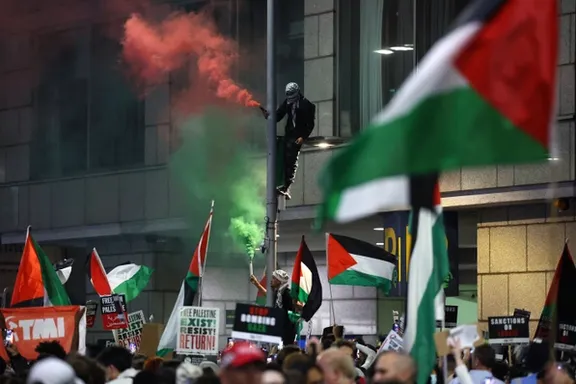
The Metropolitan Police Commissioner has admitted that the UK capital’s police force has “a gap” in how it deals with Islamic extremism.
His comments come after tens of thousands of protesters came to the streets of London in Iran-backed demonstrations calling for ‘free Palestine’.
As revelations came to the extent of the extremist sentiment at the rally in central London, Commissioner Sir Mark Rowley admitted on Sky News: “There's bodies of law to deal with terrorism and hate crime but nothing to deal with extremism. This leaves a gap.”
In The Times on Saturday, it was revealed that Tehran is behind the protests as it tries to escalate tensions against its archenemy Israel amidst its war with Hamas in Gaza which broke out on October 7 when Hamas militia invaded Israel in a terror attack. Thousands came by land, air and sea, killing at least 1,400, mostly civilians, and kidnapping 230 more.
The demonstrations have also raised serious questions about the UK’s dealings with extremism in a year when the UK’s top security and political chiefs admitted that Iran remains one of the UK’s biggest threats.
In the article in Saturday’s The Times, it said police sources admitted that protests were found to be “directly linked to the Iranian regime and includes a campaign of online disinformation and Iranian operatives being physically present at protests”.
The UK has refused to designate the Islamic Revolutionary Guards Corps as a terrorist organization, designated by the US, in spite of numerous attempted attacks on UK soil.
Earlier this month, the UK’s counter extremism commissioner, Robin Simcox, warned that the “scale of Iranian-backed activity in this country; and the extent to which Iran attempts to stoke extremism here” was massively under addressed.
MI5 chief Ken McCallum also addressed the issue this month, warning that while Iran has been posing a threat for “a long time”, Iran’s proxy war on Israel would take things in a new direction.
“In particular, the last 18 months or so have been a particularly intensive phase of Iran-generated threat on UK soil. Plainly, events in the Middle East sharpen the possibility that Iran might decide to move into new directions”, he said.
Following Saturday’s protests, analyst Amy Mek wrote on X that “Islamic Terror accounts on Twitter are reporting (celebrating) that Muslim Hamas supporters have overpowered police and are marching toward the Israeli embassy while shouting genocidal jihad chants.
She wrote of the Muslims chanting ‘Khaybar Khaybar ya yahoud’ meaning ‘we will exterminate the Jews today just as Mohamed massacred them in the Khaybar oasis in 629’ in rallies in Trafalgar Square.
“Muslims once again are promising death to Israel and death to the Jews,” she wrote.
Pointing out the problematic issue long challenging the UK which has always raised controversy for the human rights it grants terrorists: “Being accused of Islamophobia have resulted in arrests and prosecutions in the United Kingdom. However, the disturbing double standards of speech policing are evident when Muslims call for the death of Jews and Jihad on the streets of London.”
The UK’s problems are not only confined to Iran, and it is not only the UK which is seeing a rising tide of Islamic extremism, mass protests taking hold across Europe.
Simcox earlier this month raised the red flag to numerous clerics which are on UK soil, several of them praising the barbarity associated with the likes of Al Qaeda and ISIS.
Controversial figures such as Abu Hamza and Anjem Choudary have long been met with calls for more strict management of the country’s mosques.
One counter terrorism expert in the UAE said the issue lies with the country’s failure to enforce integration. “These preachers come from their home countries and preach as if they are still in their home countries, without integrating their communities to be a part of society, so their loyalty is never with their adopted country.
“They stay aligned with the plight of the people back home and rather than see themselves as British Muslims, they continue to be whatever their original nationality is, only abroad. The UK has long failed to find a way to train and integrate its clerics.”
Earlier this year, a review into the country’s Prevent programme, a counter terrorism intervention scheme, found that it had spent more time focusing on the far right that Islamic extremists, leading in one case to the murder of an MP.
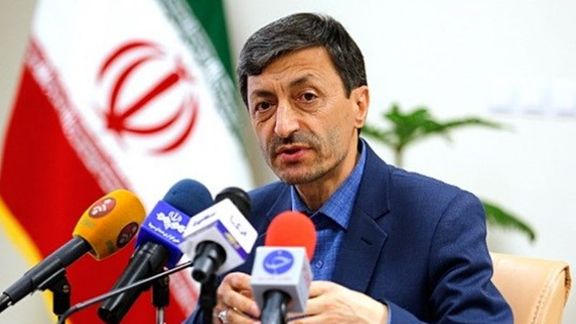
Iran's Supreme Leader has appointed a heavily sanctioned ex-IRGC member to head the Execution of Imam Khomeini's Order (EIKO), a vast economic conglomerate under his personal control.
Parviz Fattah is a prominent Iranian conservative politician who has previously served as a member of the Islamic Revolutionary Guards Corp (IRGC) and held the position of Minister of Energy in Mahmoud Ahmadinejad's first cabinet from 2005 to 2009.
The US Treasury Department imposed sanctions on Fattah in 2010 due to his involvement with Bonyad Taavon Sepah, an organization that provides services to the Islamic Revolutionary Guard Corps (IRGC). Additionally, he was sanctioned by the US Treasury in November 2020 due to his connections with Supreme Leader Ali Khamenei.
EIKO was also sanctioned in 2021, days before President Trump left office, which was imposed for Iran’s destabilizing activities in the Middle East and its missile program.
The conglomerate, under Khamenei's control, has extensive assets across Iran, and is believed to be orchestrating an increasing number of confiscations of properties belonging to the Iranian minority Baha’is community, one of the most persecuted minorities in Iran.
Fattah also led the Imam Khomeini Relief Foundation from 2015 to 2019 and has been the head of the Mostazafan Foundation since 2019.
As part of the reshuffling, Hossein Dehghan, a former IRGC air force officer with the rank of brigadier general and former Minister of Defense of Iran, has taken over as the head of the Mostazafan Foundation, succeeding Fattah.
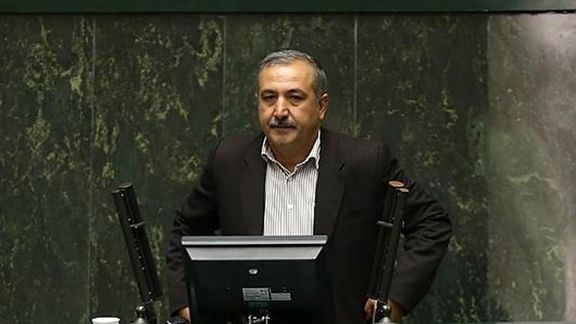
An Iranian Member of Parliament has exposed a widespread campaign of purges, suspensions, and dismissals affecting school administrators across the country.
Jalal Mahmoudzadeh, speaking on Sunday, provided alarming statistics, stating that approximately 15,000 to 20,000 school administrators have been replaced since the appointment of Reza Morad Sahraei as the Minister of Education.
The "purification process," as described by the MP, has extended its reach from universities to the education sector, resulting in the sidelining of teachers, school administrators, and even the expulsion of professors. The campaign shows no signs of slowing down.
The developments come on the heels of Reza Morad Sahraei's announcement last month that a "transformation plan" would be implemented in 5,000 schools during the current Iranian year, scheduled to conclude on March 20, 2024. The plan was initiated after a wave of anti-government protests involving numerous school students. Sahraei has committed to ongoing changes and expansion of the program.
The term "political purification," widely discussed in Iranian media, extends beyond educational institutions. Various organizations and institutions have faced similar purges as hardline elements of the regime sideline their rivals. The notion of "purification" was initially coined by former Parliament Speaker Ali Larijani to describe the actions of ultraconservative allies of President Raisi, aiming to consolidate government power by marginalizing other politicians and officials.